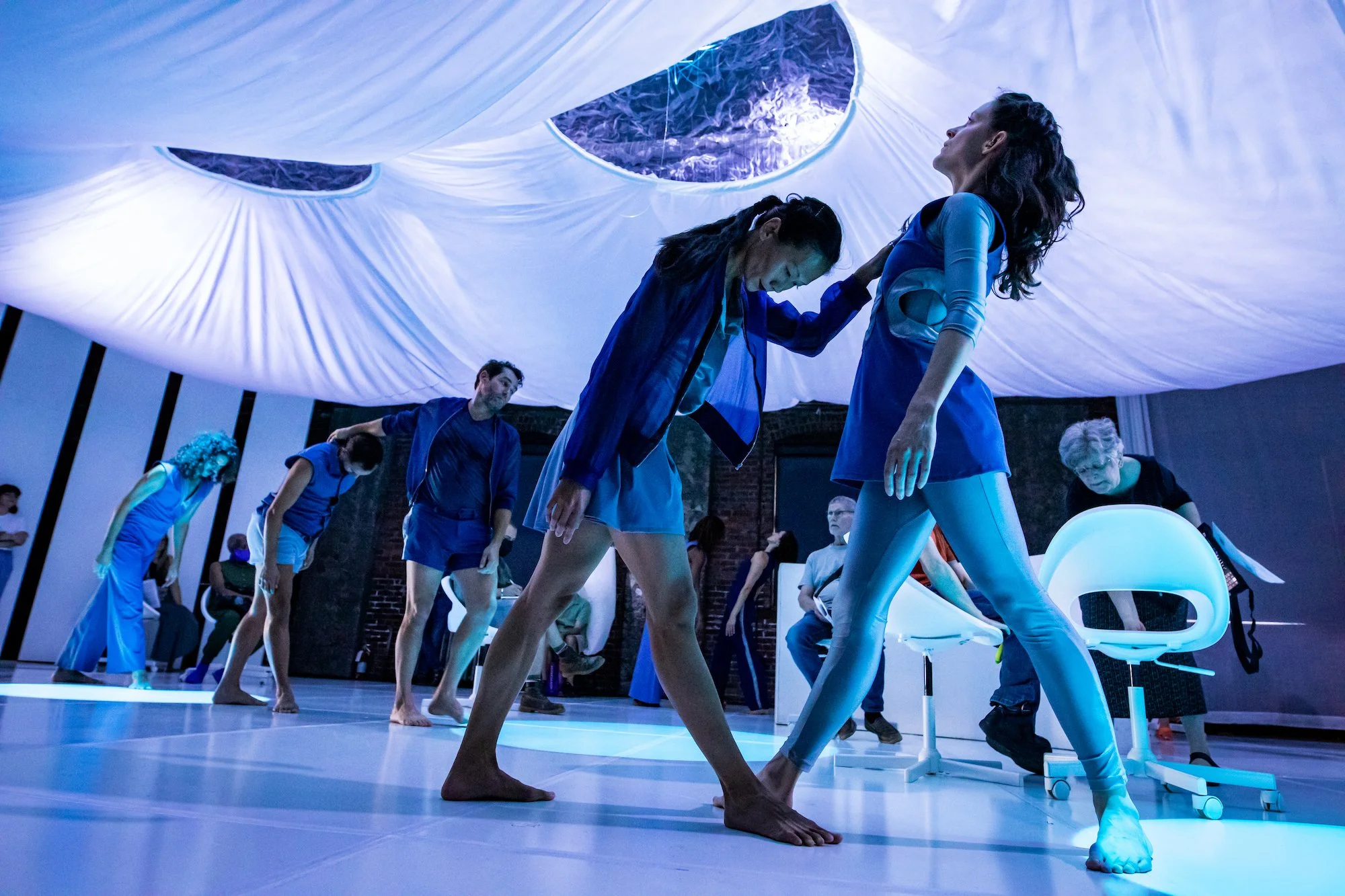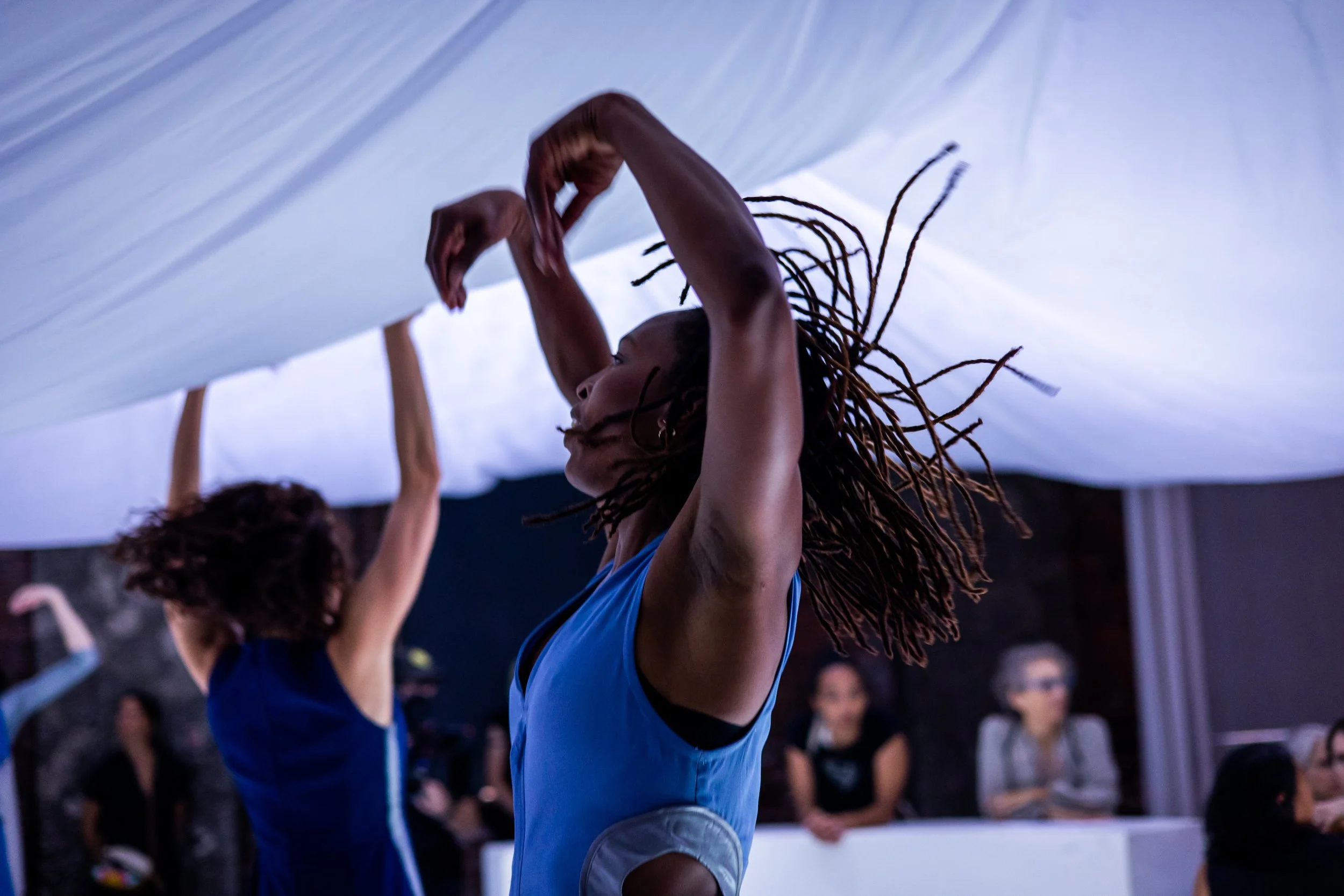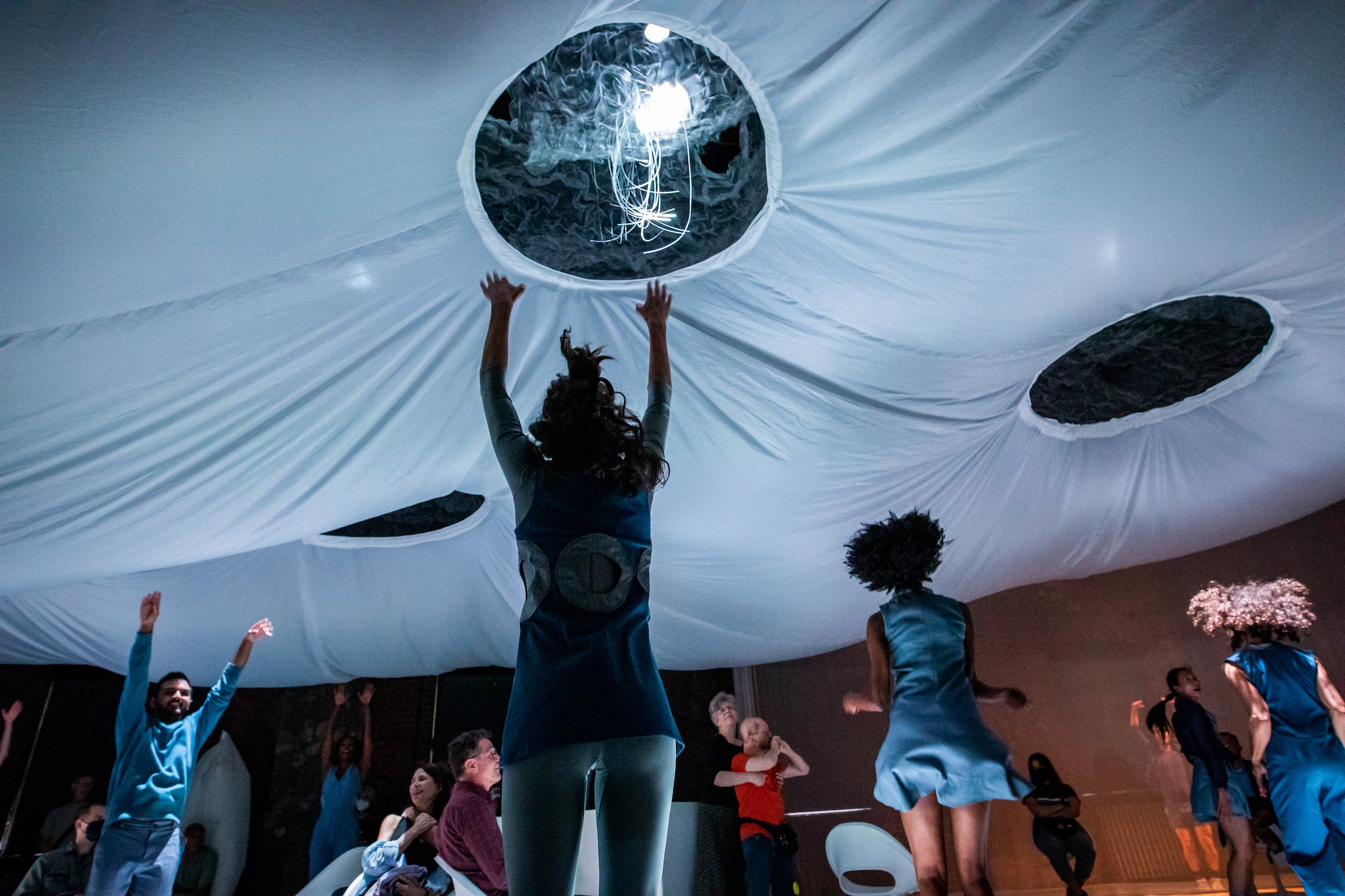rhythm bath (2023)
Choreographer & Director Susan Marshall
Set Designer Mimi Lien
Performers Rohan Bhargava, Ching-I Chang, Sydney Donovan, Nico Gonzales, Courtney Henry, Shayla-Vie Jenkins, Vanessa Knouse, Albert Quesada, Gabrielle Revlock, Darrin Michael Wright
Lighting Jeanette Yew
Sound Composition & Design Dan Trueman, Jason Treuting
Costume Design Oana Botez
Premiere September 17–24, 2023, Philadelphia Fringe Festival (Curated Performance), Christ Church Neighborhood House, Philadelphia, PA
Producing Partner Temple University’s Institute on Disabilities
Rhythm Bath is an invigorating mash-up of a dance performance, sculpture garden and otherworldly lounge.
This dance-installation offers a paradigm shift in theater-going, in which the audience is free to roam right through the dance. Enter a transporting space of rhythmic music and movement, floating fabric, and glimmering light, where there is no “right” way to be. Sit, lounge, stand, walk, roll on wheeled chairs—move as you need to, come and go as you please. Experience being in the midst of movement happening all around you as the dancing adjusts to wherever you are.
From Susan Marshall:
After decades of creating works mostly for the stage, I started the Rhythm Bath project because, as a parent of an autistic and art-loving man, there have been few opportunities for my family and me to enjoy art together with other people without the anxiety caused by the rules of etiquette governing most theaters and museums. My son is someone who needs to move a lot and who makes involuntary sounds like humming and whistling. As such, he has seldom been able to attend dance performances for proscenium stages because other audience members would find his way of being “disruptive.” My son is not alone; many autistic people are active and vocal. I wanted to make a work that would welcome both those audiences who are comfortable with traditional theater-going rules, and those who tend to be excluded.
Rhythm Bath is what it sounds like: a chance to be surrounded by rhythm—visual, aural, and kinesthetic. Our brains are wired to entrain with rhythm, and to link to others’ movements through a neurological process called interpersonal synchrony. Over the course of Rhythm Bath, the movement and music shifts from a pulsing, almost dance party rhythm to one of oceanic calm. Viewers can relax and soak it in quietly, or follow the action and be energized by the surrounding movement. For me as a viewer, one of the aesthetic experiences is in noticing the patterns and lines that are created by the dancers as they change location in response to audience members’ shifting placement, and how, at times, members of the audience become an unpredictable part of the choreography.
Rhythm Bath is this specific dance-installation—yet a “rhythm bath” more broadly could be a new form of performance that offers audiences an inclusive place to engage in an aesthetic experience, connect through rhythm, and enjoy art together as an impromptu community.
Rhythm Bath REACTIONS
“Transporting. A bath for the nerves, indeed.” —The Dance Journal
“It was, in its quiet way, the most nourishing thing I saw.” —The New York Times, Something for Everyone, Even Cannibals, at the Philadelphia Fringe
It felt like a total sensory experience in a way that I haven’t ever had at a regular dance performance… Fluid, mesmerizing, and luminous… It was unlike anything I have ever experienced in a “theater” space and I applaud the innovation. —Audience Member
Rhythm Bath’s very success in achieving a collective experience of meditation and joy for a diverse audience holds a promise of a greater inclusiveness to come. —Thinking Dance, Swimming Together in “Rhythm Bath”
I particularly enjoyed feeling surrounded/embraced by the dancers and I sometimes felt myself moving in sync with them. I also savored laying on the floor at the end to look up at that incredible installation that felt like clouds or a womb. —Audience Member
CBS News Philadelphia: "Rhythm Bath" aims to help make performing arts more accessible to families with disabilities
WPVI-TV / 6ABC: Fringe Festival set to stage world premiere of "Rhythm Bath" inclusive dance installation
KYW Newsradio: "Rhythm Bath" creates immersive theater experience for neurodiverse audiences
NBC10: Experience Rhythm Bath, an immersive dance installation at the Philly Fringe Festival | Philadelphia on the "Fringe" as festival returns
Broad Street Review: Philly Fringe 2023: Susan Marshall and Mimi Lien present Rhythm Bath
Philadelphia RowHome Magazine: Rhythm Bath: An immersive and inclusive dance installation
Metro Philadelphia: Fringe Festival shows you can't miss in 2023 | The Philadelphia Fringe Festival 2023 opens this weekend — here's what to expect
WORK-IN-PROGRESS SHOWINGS
August 2023: Christ Church Neighborhood House, Philadelphia, PA
Performers Rohan Bhargava, Ching-I Chang, Sydney Donovan, Nico Gonzales, Courtney Henry, Shayla-Vie Jenkins, Vanessa Knouse, Albert Quesada, Gabrielle Revlock, Darrin Michael WrightApril 2023: Clark Studio Theatre, Lincoln Center for the Performing Arts, New York, NY
Performers Rohan Bhargava, Ching-I Chang, Nico Gonzales, Bryn Hlava, Vanessa Knouse, Mykel Marai Nairne, Gabrielle Revlock, Darrin Michael WrightAugust 2022: PEAK Performances, Montclair State University, NJ
Performers Rohan Bhargava, Runako Campbell, Ching-I Chang, Miriam Gabriel, Nico Gonzales, Bryn Hlava, Vanessa Knouse, Junyla Silmon, Darrin Michael WrightJanuary 2020: Princeton University’s Lewis Center for the Arts, NJ
Performers Sophie Andreassi, Dare Ayorinde, Bryn Hlava, Vanessa Knouse, Mecquel, Luke Miller, Mykel Nairne, Navarra Novy, Gabrielle Revlock, Darrin Wright
Sound Ryan Wolfe
Costume Design Maile Okamura
Rhythm Bath is co-produced by Studio Susan Marshall and the Institute on Disabilities, Temple University, College of Education and Human Development. Major support for Rhythm Bath has been provided by The Pew Center for Arts & Heritage, with additional support from the National Endowment for the Arts; the John D. and Catherine T. MacArthur Foundation; New England Foundation for the Arts' National Dance Project, with lead funding from the Doris Duke Charitable Foundation and the Mellon Foundation; Princeton University's Lewis Center for the Arts; and generous individuals. Rhythm Bath was developed in part during residencies at PEAK Performances at Montclair State University, and the Clark Studio Theater as part of Mimi Lien's artistic residency at Lincoln Center for the Performing Arts.
Photos: Ashley Smith, Wide Eyed Studios











